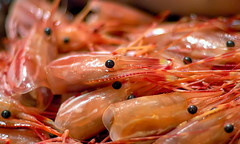Columbia's aquaculture industry has boosted its exports thanks to work carried out at the Colombian
Aquaculture Research Center.
The centre, which was
founded in 1993, carries out government-funded research projects and provides fish and shrimp larvae to fish farms.
The main aim of the centre is to help improve the
quality of farmed species in the country which is yet to fully exploit its aquaculture potential.
Food Certification International Ltd (FCI) has joined the Global Aquaculture
Alliance's
team of Best Aquaculture Practices (BAP)-approved third-party certification bodies.
In a service agreement between the two
organisations, FCI will conduct auditing and certification activities
for aquaculture farms, hatcheries, processing plants and feed mills that
apply for BAP certification.
“FCI is extremely pleased to have been awarded
approval by BAP and is looking forward to assisting in the ongoing
growth of the BAP standards into new species and geographies. The
ability to provide BAP certification complements FCIs service offering
to the international aquaculture and seafood processing sectors,” said Martin Gill, managing director,
FCI.
Can aquaculture offset Ghana's fish deficit?
Etornyo Agbeko, a researcher at the Water Research Institute for the Council for Scientific and Industrial Research (WRI-CSIR), has claimed that aquaculture could be a way fill the country's 960,000 mt fish deficit.
One potential option Agneko is exploring is using dugout ponds to raise fingerlings. Water from these ponds is usually used for crop irrigation. Growing fish in the water would double its usage and the fish waste would have added benefits for crops.
Tackling this the fish deficit could help reduce the malnutrition rate in Ghana which currently stands at 28 percent.
 |
| shrimp-heads-dau-tom (Photo credit: Phú Thịnh Co) |
A
research scientist has said Ghana’s fish deficit of 960,000 metric
tonnes could be met if government puts adequate measures in place to
improve aquaculture in the country, especially in the three northern
regions.
Mr Etornyo Agbeko, a researcher with the Water Research Institute of the Council for Scientific and Industrial Research (WRI-CSIR), said when aquaculture is embraced, fish would be in abundance, which would address the challenge of the nation’s high malnutrition rate of about 28 per cent.
It would also reduce the nation’s fish import of 175, 000 metric tons estimated to cost $157 million.
Mr Agbeko, who disclosed these to the GNA on Tuesday in Tamale, said government needed to resource the WRI in the area of infrastructure to help meet the fish shortfall in the country.
He said bad fishing practices and the negative effects of climate change, which included low and high water levels, had affected fish stock, resulting in a dwindling effect in fish production.
- See more at: http://www.ghanabusinessnews.com/2013/09/03/aquaculture-can-offset-fish-deficit-scientist/#sthash.h0cDPtLN.dpuf
Mr Etornyo Agbeko, a researcher with the Water Research Institute of the Council for Scientific and Industrial Research (WRI-CSIR), said when aquaculture is embraced, fish would be in abundance, which would address the challenge of the nation’s high malnutrition rate of about 28 per cent.
It would also reduce the nation’s fish import of 175, 000 metric tons estimated to cost $157 million.
Mr Agbeko, who disclosed these to the GNA on Tuesday in Tamale, said government needed to resource the WRI in the area of infrastructure to help meet the fish shortfall in the country.
He said bad fishing practices and the negative effects of climate change, which included low and high water levels, had affected fish stock, resulting in a dwindling effect in fish production.
- See more at: http://www.ghanabusinessnews.com/2013/09/03/aquaculture-can-offset-fish-deficit-scientist/#sthash.h0cDPtLN.dpuf
A
research scientist has said Ghana’s fish deficit of 960,000 metric
tonnes could be met if government puts adequate measures in place to
improve aquaculture in the country, especially in the three northern
regions.
Mr Etornyo Agbeko, a researcher with the Water Research Institute of the Council for Scientific and Industrial Research (WRI-CSIR), said when aquaculture is embraced, fish would be in abundance, which would address the challenge of the nation’s high malnutrition rate of about 28 per cent.
It would also reduce the nation’s fish import of 175, 000 metric tons estimated to cost $157 million.
Mr Agbeko, who disclosed these to the GNA on Tuesday in Tamale, said government needed to resource the WRI in the area of infrastructure to help meet the fish shortfall in the country.
He said bad fishing practices and the negative effects of climate change, which included low and high water levels, had affected fish stock, resulting in a dwindling effect in fish production.
- See more at: http://www.ghanabusinessnews.com/2013/09/03/aquaculture-can-offset-fish-deficit-scientist/#sthash.h0cDPtLN.dpuf
Mr Etornyo Agbeko, a researcher with the Water Research Institute of the Council for Scientific and Industrial Research (WRI-CSIR), said when aquaculture is embraced, fish would be in abundance, which would address the challenge of the nation’s high malnutrition rate of about 28 per cent.
It would also reduce the nation’s fish import of 175, 000 metric tons estimated to cost $157 million.
Mr Agbeko, who disclosed these to the GNA on Tuesday in Tamale, said government needed to resource the WRI in the area of infrastructure to help meet the fish shortfall in the country.
He said bad fishing practices and the negative effects of climate change, which included low and high water levels, had affected fish stock, resulting in a dwindling effect in fish production.
- See more at: http://www.ghanabusinessnews.com/2013/09/03/aquaculture-can-offset-fish-deficit-scientist/#sthash.h0cDPtLN.dpuf


No comments:
Post a Comment